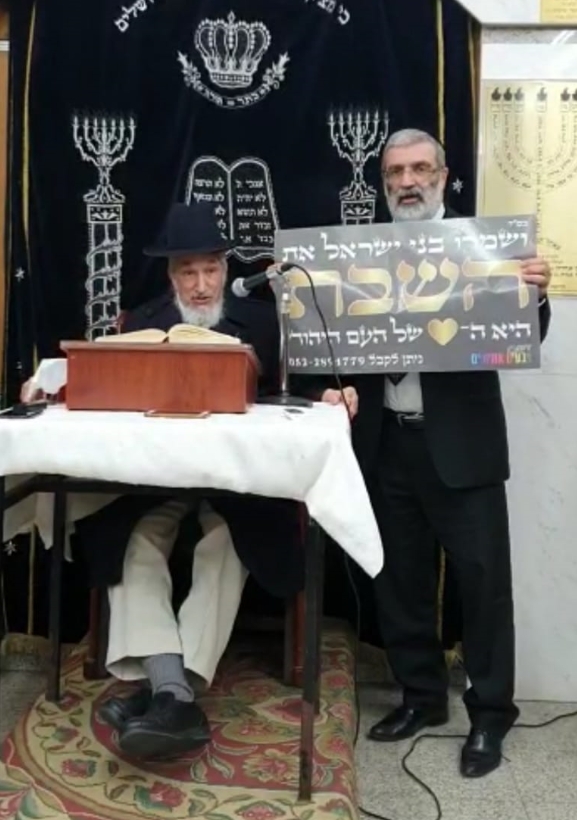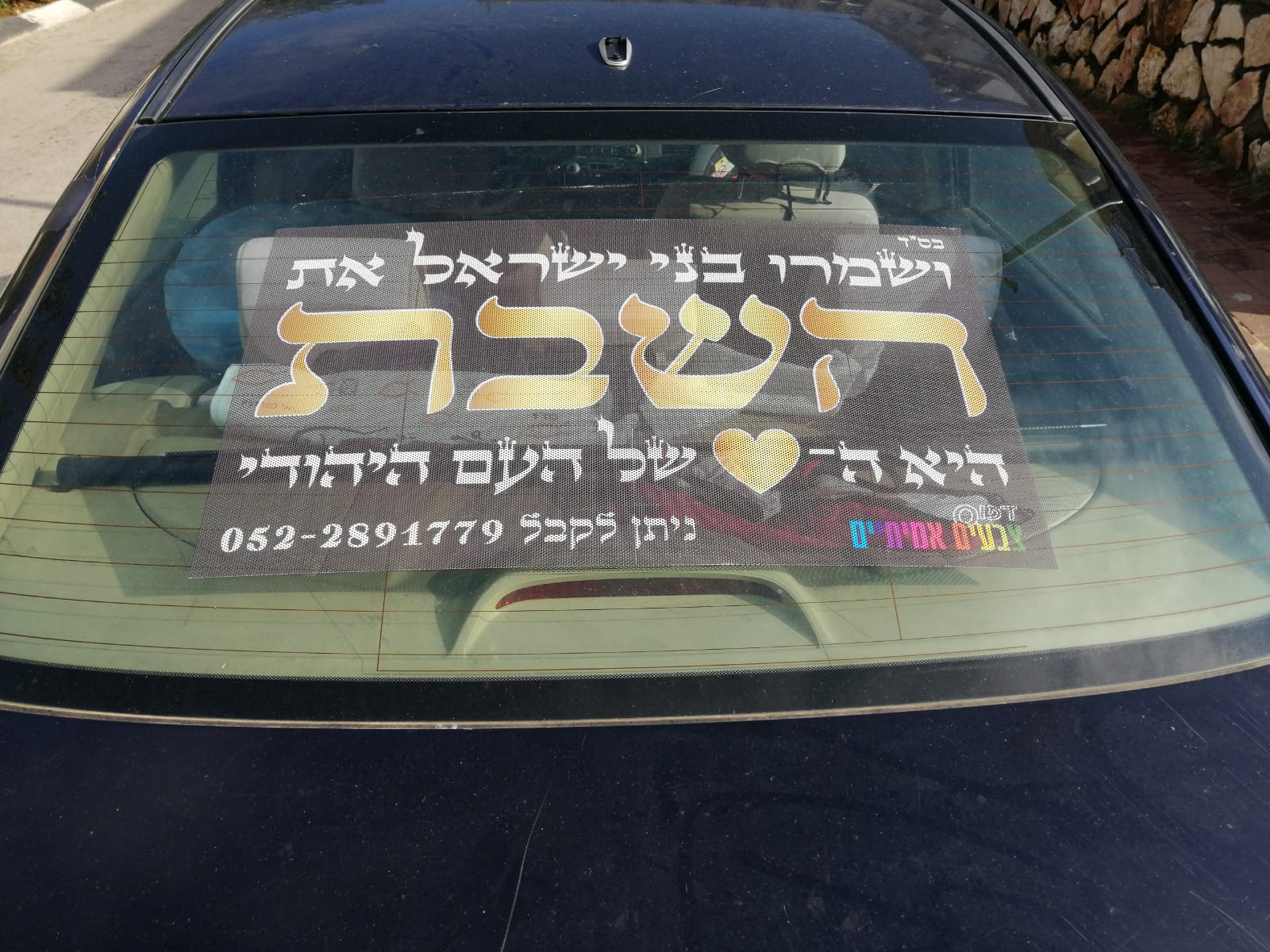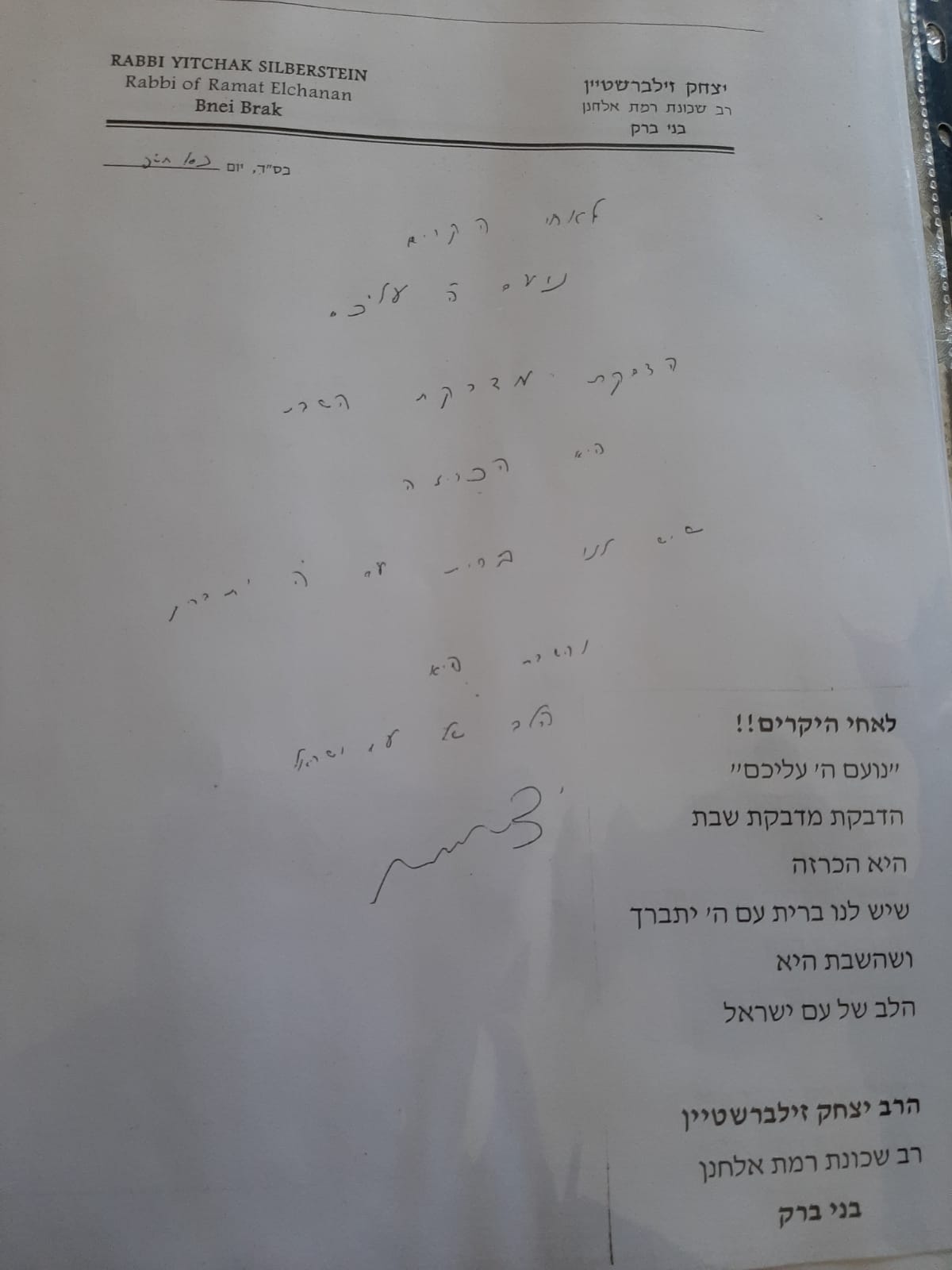Rabbi Uri Menashe: "I Wanted to Strengthen Shabbat Observance, I Didn't Anticipate Where It Would Lead"
After years of outreach, Rabbi Uri Menashe began distributing special stickers declaring: "The Children of Israel shall keep the Shabbat, Shabbat is the heart of the Jewish people." His vision spreads nationwide, and in conversation he explains how the idea was born.

While most of Israel lounges drowsily on the sofa after the Shabbat meal, Rabbi Uri Menashe, a husband and father of seven, continues his outreach efforts inside and outside his home. He hosts youths for Shabbat meals, an act of love for many of his family members. His wife, Dalia, assists in a kindergarten and prepares Shabbat meals for needy families, while his son, Netanel Shimon, distributes challah on Thursdays to families.
Rabbi Menashe's daughter, Hannah, is married to the son of renowned lecturer Rabbi Michael Lasry. Rabbi Menashe, leveraging this special connection with his in-law, spends Shabbat evenings visiting synagogues throughout Ramat Gan, encouraging the youth. As part of his extensive activities, he also holds conferences to strengthen and bring the public closer, featuring Rabbi Fanger, Rabbi Shneor Gueta, Rebbetzin Hadavah Levy, and even Rabbi Zamir Cohen.
Discovering Judaism Between Goal and Penalty
However, Rabbi Menashe has not always been a part of the Jewish world. As a teenager growing up in the Ramat Hashikma neighborhood, his life revolved around soccer, which was more than just a hobby for him. He cemented his status as a star of his team, earning the nickname "King of Goals" from his friends. At one point, he even played for the Maccabi Ramat Hashikma Ramat Gan team. But under divine providence, between goals and penalties, Rabbi Menashe discovered the wonders of Judaism.
"In our neighborhood, there was a community center called 'Beit David Club' serving the local residents," he recounts. "One prominent figure at the community center began to strengthen his religious devotion and occasionally brought in rabbis to teach the youth basic Jewish concepts, like how to don tefillin, observe Shabbat, and the like."

"We young people, who came for soccer, ping-pong, and tennis, began to accustom ourselves to the presence of the yeshiva students, the scholars who frequented the place. We started asking questions, and to our surprise, we received answers that left no room for doubt—at least for me. Although I always had an affinity and connection to Judaism, having grown up in a traditional household and being attached to the mitzvah of donning tefillin, it was limited to that. In my youth, I had entirely different aspirations. I dreamed of living in London, where I had a family, and starting my life as a young man. I dreamed of becoming a successful businessman and a cosmopolitan."
"From a young age, around 16, I already managed a renowned restaurant in 'Kfar Maccabiah,' called 'Acropolis Olympia.' I quickly became acquainted with all the high society figures in Israel as well as wealthy individuals from South Africa. I established connections and friendships, all the options were open to me, and the future appeared rosy. In hindsight, I understand that these were merely the vanities of this world that we are lured into by the evil inclination."
"Fortunately, I was drawn even more to Torah classes, and thanks to the yeshiva students who came to the community center, I gradually approached our Father in Heaven every day. When the first conscription notice arrived, I decided to forgo the army in favor of studying at the 'Or David' Yeshiva in Pardes Katz. I studied there for five years. It was a happy and magical period in my life, filled with satisfaction from the intensive study. A friend from the yeshiva introduced me to my wife. We married when I was 24, and since then, the rest is history."
"We Can't Open Sunflower Seeds and Let the World Order Crash Under Our Noses"
As someone engaged in outreach for many years, what led you to recently focus specifically on Shabbat?
"Unfortunately, turbulent winds have been blowing in the country lately, primarily from the leadership of Ramat Gan, my childhood city. Many people familiar with my efforts in the city approached me in amazement: 'What's happening to you guys in Ramat Gan?' There were also influential figures, whose motivations I cannot understand, trying to infuse the public consciousness with a false message, as if the Jewish people were just like any other nation and as if Shabbat were just another regular weekday. They attempted to propagate the outdated and irrelevant notion that the sanctity of Shabbat is no more. Their arguments, such as 'Let us drive to the beach on Shabbat' or 'Let us visit Grandma,' seem logical to those not genuinely connected to the tradition, and who have not internalized the significance of Shabbat for our existence as a nation."
"It was difficult to watch public defiance and insolence against Shabbat, attempting to trample its sanctity publicly. When I saw the foundational pillar of the Jewish people being so blatantly desecrated, I understood that I could no longer remain silent. I decided that I must convey the true and correct message of Shabbat: 'The children of Israel shall keep the Shabbat...'—all of us, as a nation, own Shabbat."
"Just as Pinchas stood up for the desecration of Hashem's honor, so too are we commanded to protest. We cannot sit comfortably on Shabbat, eating and drinking, while the world order crashes under our noses. As those walking in the ways of Hashem, we cannot content ourselves with publishing Shabbat leaflets and writing books to convince the already convinced. We need to work among our estranged brothers, too."
This is how Rabbi Menashe conceived the idea of spreading the message through a sticker displayed on car windows. "I chose stickers because I was looking for a heartfelt message that would spread consistently and reach many people. After much consideration, I concluded that a sticker on car windows is the most effective way to achieve my goal. As those opposed to Shabbat's sanctity in public wanted to desecrate it, so will we promote its sanctity and sanctify Hashem publicly. However, it was crucial for me to do it properly and constructively."

What do you mean by that?
"I can speak for myself: I live in a 27-story building, with neighbors who don't even know what a synagogue looks like inside. Nonetheless, I respect them. When I return with my children from synagogue on Friday night, it doesn't matter who we encounter—someone with a dog, a neighbor with a phone, a young man with a cigarette, or someone washing his car—we greet them with genuine smiles and a heartfelt 'Shabbat Shalom,' to which they respond with a smile. This is the magic, to come from a place of love and unity."
"Many people who are totally secular still feel in their hearts that the current disrespect for Shabbat's character and the status quo isn't right, but they have no voice. I also know people who want to go to synagogue but are too embarrassed. They have no idea how to hold a prayer book or pray, creating enough discomfort to make them give up the idea. At the end of the day, the majority of Israel are righteous with massive hearts. Correspondingly, in the distribution of the stickers, I decided to broadcast love, and I chose the inscription Hashem guided me to: 'The Children of Israel shall keep the Shabbat, it is the heart of the Jewish people.'"
He provides an interesting explanation: "Rashbi writes in the ' Beresheet Hamann,' 'The Children of Israel shall keep the Shabbat' and later mentions that Shabbat is related to the heart. I also heard a lecture by Rabbi Yosef Mugrabi, who spoke about the virtue of Shabbat and mentioned the verse we recite on Tisha B'Av, 'The joy of our heart has ceased; our dance has turned into mourning.' Rabbi Ben Zion Abba Shaul explained that Shabbat is our joy, yet it can turn into mourning for those who desecrate and transform it into a regular day."

Rabbi Menashe emphasizes: "The people of Israel are a people of kindness and giving. A single sticker costs me about ten shekels, as it is a high-quality sticker, measuring 40-70 cm, which doesn't obstruct the driver's field of vision. The financing for printing the stickers comes from my personal pocket and donations from good people. I've encountered many folks who come to me and take stickers to distribute in far-off places like Tiberias, Kiryat Ata, Ofakim, Sderot, and more. I must also mention the righteous individuals from the 'Sanctifiers of the Seventh' organization, who contacted me on their initiative, ordered stickers, and started wide distribution. Honestly, I didn't know them at the time, but I was happy for everyone who joined in spreading my vision.
"Any Jew who wishes to take stickers for their personal vehicle, or to distribute them, is welcome. They should know that thanks to them, we will continue to sanctify Hashem's name, and the prestige of Shabbat will continue to rise, with Hashem's help, among the general public."
To contact Rabbi Uri Menashe: Uri0522891779@gmail.com
To contact 'Sanctifiers of the Seventh' Organization: ms0795293630@gmail.com

